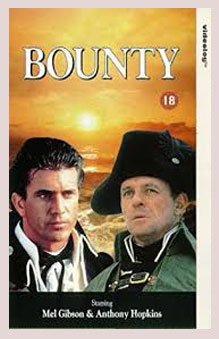
Numerous successful novels have been equally triumphant – when turned into film productions. Mutiny on the Bounty is the title of the 1932 novel by Charles Nordhoff and James Norman Hall, based on the real-life mutiny aboard HMAV Bounty – against Lieutenant William Bligh, commanding officer of the Bounty in 1789.
The film versions came in 1935, 1962, and 1984. The 1935 version starred Clark Gable and Charles Laughter. In the 1962 version Marlon Brando and Trevor Howard were starring. Each movie had its own originality in creating the historical saga, and The Bounty (1984), starred Mel Gibson and Anthony Hoppins. Predominately, one feature which was common among all the productions was that the main roles were that of Fletcher Christian and William Bligh.
The first movie (1935) followed the Nordhoff and Hall novel, whereas, the 1962 version focused on the adventuresome trip to Tahiti – where the crew landed for their mission in collecting saplings of breadfruit trees.
Speaking of The Bounty (1984). This film version is adopted from Richard Hough’s book – which differs from the novel and from other adaptions.
Christian was Bligh’s second-in-command-officer, and when the mutiny took place, he had many loyal sailors backing him up on a ship which was very small as compared to our present-day-standards. The storyline majorly emphasizes about the different social classes which Bligh and Christian belonged to. Another sore point came up when the meager half-ration of water to the crew versus watering the breadfruit saplings arose. Those breadfruit saplings were a cargo meant to produce a cheap staple for the slaves of the British Empire stationed in the West Indies. Over time, the cruise becomes a total disaster, when Fletcher sees the cruelty in Bligh, who is always threatening his crew with the severity of “sea laws.” When Bligh continues to inflict harsh punishments for minor offences, Fletcher cannot bear it any longer.
The movie is great in documenting the era of the 18th century. Mel Gibson and Anthony Hawkins make a very strong impression on the audience.
The Film is produced by Bernard Williams & Dino De Laurentils and directed by Roger Donaldson. Music is by Vangelis and Cinematography is by Arthur Ibbetson.
Geeta Chhabra